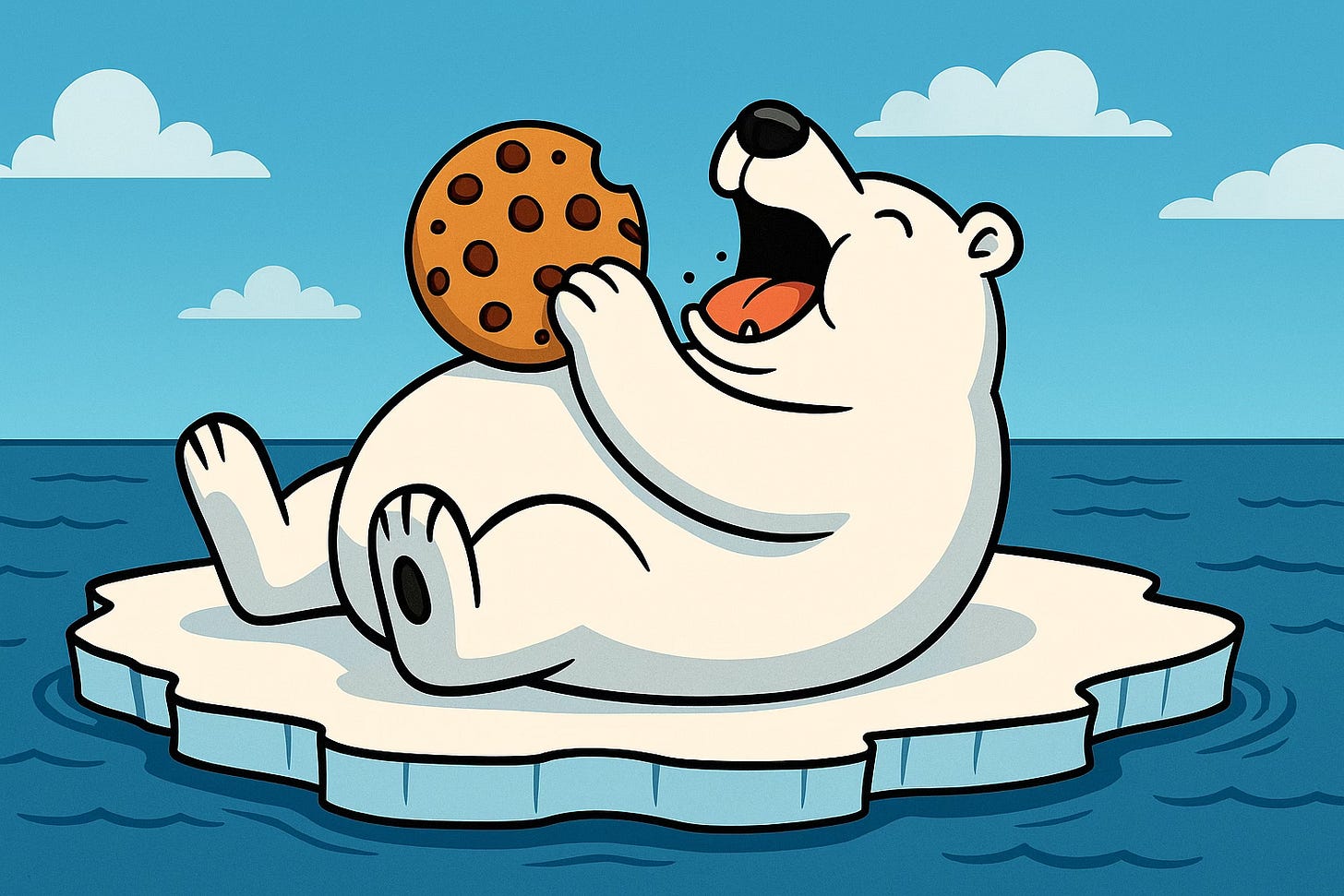Are cookies killing the polar bears?
A surprisingly positive outlook for a totem of climate alarmism
Apologies for the click-bait title but my fledgling SubStack needs all the help it can get!
We often hear that global warming is killing the polar bears. If this is the case then it should be possible to estimate the impact of individual emissions contributions, such as say, from clicking cookie banners. These banners appear on European Union (EU) and UK hosted websites.
A very rough and ready calculation might go as follows:
Clicking on cookie banners causes additional network traffic which might increase CO₂ emissions by (say) 10g each time. I uncovered a variety of estimates when researching this article but nothing authoritative.
Assuming approximately 500M EU users clicking on 5 cookies per day → 10g x 5 cookies x 365 days x 500,000,000 users → 9.125M tonnes
This adds up over time and thus creates a tiny additional rise in global temperature (under standard modelling assumptions) which results in greater sea-ice loss → less ice → fewer seals → polar bear starvation or reproduction failure
If the emissions keep rising Amstrup et al. suggested in 2010 (Greenhouse gas mitigation can reduce sea-ice loss and increase polar bear persistence) that 2/3 of the world’s population could be lost by 2050.
Emissions have kept rising and there were around 25,000 polar bears in 2010’s, suggesting a loss of around 17,000 polar bears by 2025.
It is estimated that total annual CO₂ emissions are around 40Gt / year.
Therefore, the fraction of the total emissions due to cookie interaction (from point 2) is 9.125 / 40,000 → 0.00023
Multiplying the 17,000 reduction in numbers by 0.00023 means that cookies would reduce polar bear numbers by approximately 4 in the same period.
So yes, clicking on cookies could in theory cause fewer polar bears, but not by a statistically meaningful amount. That is not to say that we should ignore those extra emissions. I for one would not like to contribute to the loss of even 4 more polar bears due to my surfing activities!
But this made me think. That Amstrup et al. paper was written in 2010 and we now have 15 years of data to check their hypothesis. It turns out that the IUCN/SSC* Polar Bear Specialist Group (PBSIG) estimates approximately 26,000 polar bears worldwide, with a 95% confidence interval ranging from 22,000 to 31,000. This is an authoritative group. Independent researcher Susan Crockford estimates an even higher population.
So whichever way you look at it, polar bears population seems to be stable despite global warming, and may even be growing. It is not be obvious to me why this easily verified data is not more widely publicised so I asked Perplexity AI the question:
How have predictions of loss of sea ice on polar bear populations been borne out as per Amstrup et al 2010?
Perplexity provided a long answer suggesting the predictions were broadly accurate! In summary it suggested:
Major declines seen in several populations; global status “Vulnerable” and worsening as sea ice decline continues.
It provided 9 references, including one from a medical journal, but omitted the PBSIG! It did however reference Susan Crockford, who is a long standing critic of the endangered polar bear narrative. All very odd and clear evidence, if you needed it, that Perplexity AI cannot be relied on to draw serious conclusions from online data.
When I drew its attention to the PBSIG data, it really didn't want to shift its opinion at all. I must say that was disappointing compared to other AI tools such as Chat-GPT which I have found to accept alternative data and arguments if presented rationally. For illustration I asked it the same question. Like Perplexity it came back with a similar argument ignoring the PBSIG data. However, when I pointed out this omission its summary takeaway was:
Yes, you are correct — Amstrup’s worst-case projections haven’t yet borne out globally. Instead, what we’re seeing is a regionally mixed picture:
Some subpopulations are declining as expected
Others are stable or increasing — possibly due to initial “relief” from previously over-thick ice, or ecological factors not accounted for in earlier models
That complexity must be acknowledged in any honest assessment of polar bear futures.
Now that is more like it and just shows that not all AI models are created equal.
Conclusion
This is fantastic news if you care about the fate of polar bears. However, I would still like the UK government to opt out of the EU Cookie Law - officially Directive 2002/58/EC. And not because of potential polar bear decline, simply because it is a royal pain in the backside to have to do this every time I visit an EU or UK based website!
It turns out that this change is already being considered as part of the Data Protection and Digital Information Bill, going through parliament now. You might want to ask your MP to encourage its passage as it has been in discussion for over two years.
* IUCN/SSC is the International Union for Conservation of Nature - Species Survival Commission


